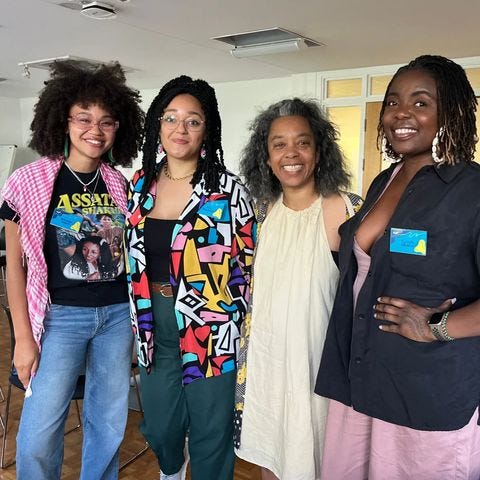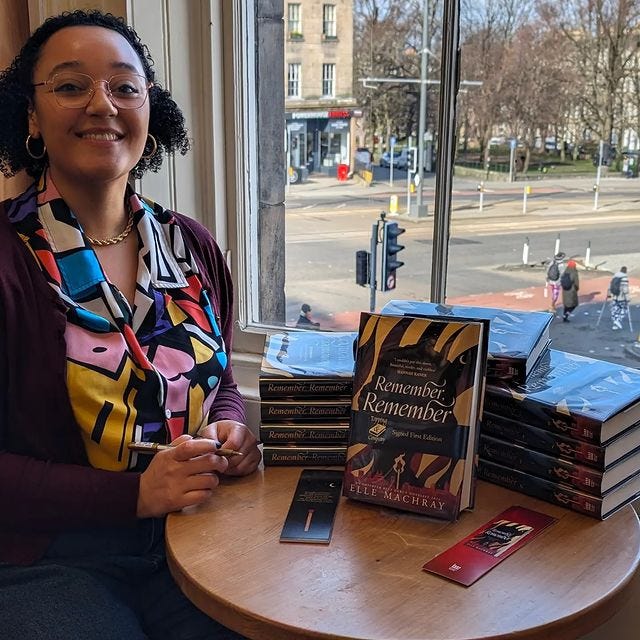Elle Machray: “You’re treading on thin ice with your privilege – it's very scary”
The author on cultivating communities, tracing her ancestral history and being pulled in from the outside
Hi, welcome back to Mixed Messages! This week, I’m speaking to author Elle Machray, who is of mixed-St Lucian and white Scottish heritage. Elle’s debut novel, Remember, Remember, reimagines the gunpowder plot as we follow Delphine, who after escaping enslavement in 1700s London, now fights to help her brother do the same. A tale of empire, queer identities and fighting injustice, Elle’s novel weaves a story that will make you wonder – what if? Read her story below.
How do you describe your identity?
I say I'm mixed, Black Caribbean and white Scottish. My mum was born and raised in Wales, but my grandparents are from St Lucia. They came over in the late ‘60s. A lot of my mum’s family are still in Cardiff, which is where I was introduced to Caribbean cooking.
My dad’s family have lived in Scotland since the 12th century essentially. One of my lockdown projects was to trace the clan Machray heritage.
What made you want to start that project?
I have an English accent, was born in Wales and grew up in Birmingham. After university, I moved to Edinburgh, so I say I ‘returned’ to Scotland. A walk up Arthur’s Seat triggered me wanting to learn about the Machray side of my family – on Pipers walk, there’s a historical plaque that says “this path was named for the wild Machrays,” who were asked to march from their home in Kintail to Edinburgh.
They weren't told why they had to march, but it turns out they were all being sent to India for rebelling against the crown. They were like ‘screw that’ and marched up Arthur’s Seat and stayed there playing bagpipes for a full week.
My ancestors were part of this cool thing, so I wondered what else I didn’t know. At the same time, I was researching Remember, Remember and trying to connect more deeply with my Saint Lucian heritage. It felt like a perfect time to explore both.
What was your connection like with your heritages before this point?
My grandad from my mum’s family had a series of strokes so he wasn’t verbal and couldn't share his history. My nan was essentially adopted by a family friend so didn’t grow up with the stories of her family. We weren’t wealthy enough to travel to St Lucia, so it felt like there was this part of my heritage that I hadn't actively connected to. With Remember, Remember, I was able to learn a lot more about the history of St Lucia and the people who live there.
My dad was never that interested in learning more about his ancestral history. He knew that we had a castle, and that was all that mattered.
In terms of culture where I grew up, there was a large Asian population at school but only six Black kids in the year. There's not always been a large Black presence in my life, but because the school was so diverse, I never felt alone in that sense. Some of my best friends from school are Black and we really did cling to each other.
Has your sense of identity and confidence in that shifted over time?
All the time. Especially since leaving a diverse school to go to university in Leeds, which is diverse but less so at the university. I studied politics, which was predominantly white. That continued as I started my career in consultancy and then banking. I found myself clinging to the parts of my identity that I wanted to connect more deeply to.
I wanted to have more experiences with my Caribbean heritage, so I had to go out of my way to have those. It meant that I had to do so much code-switching. I call it being like a social chameleon, where to survive or get by in those places it often feels like you have to tone down parts of yourself.
For a very long time, I always had my hair straight. As I found myself in these predominantly white spaces, I felt like I wanted to let my hair breathe and learn to look after my curls. I wanted to feel like me in these places.
When I was working in consultancy, a couple of colleagues asked me how I defined myself. I said mixed or half-Black, and they asked why. I said “well the world’s never going to see me as white are they?” For me, that’s when I asked why I felt like I needed to prove parts of my identity.
It can feel like you’re floating on the edge of different spaces, and it would be so easy to be pulled in, but often you’re left on the outside. It’s why I think it's important to cultivate communities around you that are accepting, where you feel like you can just be yourself.
Do you feel accepted in Black literary spaces?
I've never felt unwelcome. My only barrier is me deciding whether I feel like I am worthy enough to be there. Being mixed in a light-skinned body comes with privilege, so there were so many times when I was like, ‘am I qualified to write this story?’ I had to remember that I can relate to the experiences in the book, so of course I can tell this story. It’s important to have a big community that you can sense check with, plus sensitivity readers, but to realise that yes, you are welcome and valid in these spaces too.
Have you noticed any stereotypes around mixedness?
I grew up with the whole ‘you’re so lucky to be mixed because mixed people are more attractive.’ Initially I was like ‘great,’ but as I got older, I was like, ‘what do you mean by this? Am I more attractive because of my biological genes? Or are you saying that I am a more palatable Black person and therefore more attractive and more worthy?’
There's also this idea of not always being able to fully inhabit, or feel like you can inhabit, different spaces. There's always a higher expectation put upon you, people are quicker to build you up, but the moment you make a mistake, you are only Black again. It's like you’re treading on thin ice with your privilege, and it's very scary. Obviously, it's still a privilege to inhabit spaces more easily and move more freely through them.
What’s the best thing about being mixed for you?
The vibrancy of my identity. The idea that as a writer, I inhabit the spaces and stories around my identity, learning from them and pulling from mythology and folklore. I can see parts of myself in all of them.
Can you sum up your mixed identity in one word?
Positive-paradoxical. Being mixed is about the ability to hold these different ideas of our identities and accept them all to be true and valid, able to hold space for those thoughts to transform and grow.
Get your copy of Remember, Remember here. Next week, I’ll be speaking to illustrator Nephthys Foster. Subscribe to get Mixed Messages in your inbox on Monday. Shop Mixed Messages on Etsy now!
Enjoy Mixed Messages? Support me on Ko-Fi! Your donations, which can start from £3, help me pay for the transcription software needed to keep this newsletter weekly, as well as special treats for subscribers. I also earn a small amount of commission (at no extra cost to you) on any purchases made through my Bookshop.org and Amazon affiliate links, where you can shop books, music and more by mixed creators.
Mixed Messages is a weekly exploration of the mixed-race experience, from me, Isabella Silvers. My mom is Punjabi (by way of East Africa) and my dad is white British, but finding my place between these two cultures hasn’t always been easy. That’s why I started Mixed Messages, where each week I’ll speak to a prominent mixed voice to delve into what it really feels like to be mixed.







